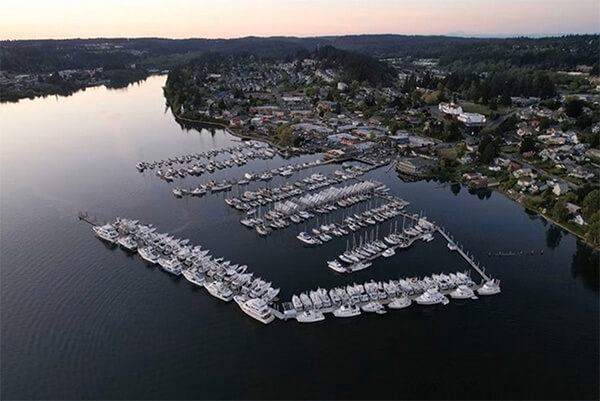By Tim Schermetzler of CSD Attorneys at Law P.S.
Can Port Districts Charge Different Rates to
Customers Outside Their Taxing Jurisdiction?
A question was recently posed by the WPPA Marina Committee. They asked, “Can a port district charge differing moorage rates for customers who live inside their taxing jurisdiction than customers who live outside their taxing jurisdiction?” This is an interesting question. This month’s column explores the answer.
Hypothetically, what if a port district charged $500 per month for moorage for customers that live inside the port district’s taxing jurisdiction but charged $700 per month for those living outside of it. Is this permissible? The short answer is likely yes, it is allowed, and it does not violate state law or the state or federal constitutions.
The starting point for examining port powers is always Chapter 53.08 RCW. Pursuant to RCW 53.08.080, “A district may lease all lands, wharves, docks and real and personal property owned and controlled by it, for such purposes and upon such terms as the port commission deems proper . . .” 1 And pursuant to RCW 53.08.320, “A moorage facility operator may adopt all rules necessary for rental and use of moorage facilities and for the expeditious collection of port charges.” 2
Both statutes provide ports the authority to adopt rules and terms that are necessary and/or proper, in the discretion of the port commission. Neither statute restricts port districts from changing different rates for different classes of moorage, as long as the charges are reasonable and consistent with the rules established by the port.
Washington courts have upheld the authority of municipalities—such as port districts—to establish differing fees for different classifications for many municipal-provided services, such as utilities 3 and moorage, 4 provided the classifications are reasonable and not arbitrary and capricious. Arbitrary and capricious actions are willful and unreasonable actions made without consideration or in disregard to the facts and circumstances surrounding a decision. In Dorsten v. Port of Skagit Cnty., a moorage lessee filed a petition challenging the port’s decision to raise moorage rates at its marina. The court characterized the setting of moorage rates as a quasi- legislative policy determination, indicating that port districts have broad discretion in rate-setting as long as the process is reasoned and not arbitrary or capricious. 5
The question of differing rates was specifically addressed by Washington courts in Des Moines Marina Ass’n v. City of Des Moines, albeit in the case of a city run marina rather than a port. In that case, the Court considered whether a city ordinance that increased moorage rates for all customers and provided higher moorage rates for non-resident customers (by 0-12 percent more than residents based on the size of the slip) impermissibly violated the Equal Protection Clause of the U.S. Constitution. 6 The City of Des Moines successfully reasoned that its residents paid taxes for police and fire service and road maintenance that non-residents did not pay, which justified the differential rates. Additionally, because nonresidents outnumbered residents, the city was justified in seeking to encourage more residents to use the marina. The court agreed with the city’s reasoning for the distinction in fees between residents and nonresidents and found that the differential rates did not violate the Equal Protection Clause. Even though this case involved a city, rather than a port district, the same legal principles apply.
Looking beyond Washington courts, other jurisdictions have also upheld that differential rates for residents and non-residents are not in violation of the dormant Commerce Clause or the Privileges and Immunities Clause of the U.S. Constitution. The Privileges and Immunities Clause ensures that citizens of each state receive the same fundamental rights and protections as citizens of other states. 7 The Dormant Commerce Clause is implicated if the port district’s differential moorage charges discriminate against interstate commerce or impose an undue burden on it. The analysis depends on whether the pricing scheme treats in-state and out-of- state economic interests differently, whether it disproportionately burdens interstate commerce, and whether the legitimate local benefits outweigh the burdens.
In a Ninth Circuit case that took place in California, Marilley v. Bonham, plaintiffs, a class of nonresident commercial fishers, challenge the four nonresident fee differentials—for commercial fishing vessel registrations, commercial fishing licenses, Dungeness crab permits, and herring gill net permits. 8 Plaintiffs brought a class action challenging the fee differentials as violating the dormant Commerce Clause, the Privileges and Immunities Clause, and the Equal Protection Clause. The Court in Marilley found that a state may justify discrimination against nonresidents, such as charging nonresidents higher fees than charged to residents, if it advances a substantial state interest, which in that case was to recover the state’s expenditures in enforcement and conservation that are attributable to the nonresidents—while residents pay for those expenditures with their tax dollars. The Court’s decisions under the Dormant Commerce Clause make much the same point about state expenditures. Privileges and Immunities Clause cases and Dormant Commerce Clause cases are often seen as relevant to one another because they are based on the same principles. 9
Washington port districts can charge a higher moorage fee to customers who live outside of their taxing jurisdiction, as long as the port commission justifies the higher cost according to some real costs expended by the port through the port’s general revenues that are collected from residents through taxes but not collected from nonresidents, and provided the port is not
otherwise required to offer moorage on equal terms resulting from federal or state grants and funding sources.
If your port is considering a differential rate scheme, it may be prudent to collect data and complete a report studying this issue and the financial impacts it may have on your port. And if your port ultimately chooses to impose a differential rate system, it is advisable to show your work by documenting the port commission’s justification for the rate differential in a resolution. These reasons could include improvements and maintenance to the marina, security to patrol the marina, periodic dredging, or other costs paid or supported by the port’s tax levy. Ports considering implementing differential rate schemes should also review whether their marina includes any federally authorized projects or other grant and funding source requirements for additional limitations on rate differential schemes. For example, your port may receive federal funding that requires access to all persons on equal terms or an equal basis – preventing preferential pricing schemes. As always, it is advisable to work with your port’s legal counsel to understand the specific requirements and limitations for your port.
1 Emphasis added.
2 Emphasis added.
3 W. Terrace Golf LLC v. City of Spokane, 29 Wn. App. 2d 755, 542 P.3d 1029, review denied sub
nom. W. Terrace Golf v. City of Spokane, 3 Wn. 3d 1006, 549 P.3d 123 (2024).
4 Des Moines Marina Ass’n v. City of Des Moines, 124 Wn. App. 282, 100 P.3d 310 (2004).
5 32 Wn. App. 785, 650 P.2d 220 (1982).
6 Id.
7 U.S. Const. art. 4, § 2, cl. 1.
8 844 F.3d 841, 845 (9th Cir. 2016).
9 Marilley v. Bonham, 844 F.3d 841, 850 (9th Cir. 2016); See, e.g., Hicklin v. Orbeck, 437 U.S. 518,
531–32, 98 S.Ct. 2482, 57 L.Ed.2d 397 (1978) (“[T]he mutually reinforcing relationship between the
Privileges and Immunities Clause … and the Commerce Clause—a relationship that stems from their
common origin in the Fourth Article of the Articles of Confederation and their shared vision of federalism
…—renders several Commerce Clause decisions appropriate support for our conclusion [under the
Privileges and Immunities Clause]).”
If you have a question for Knowing the Waters, please e-mail me at tschermetzler@csdlaw.com.



